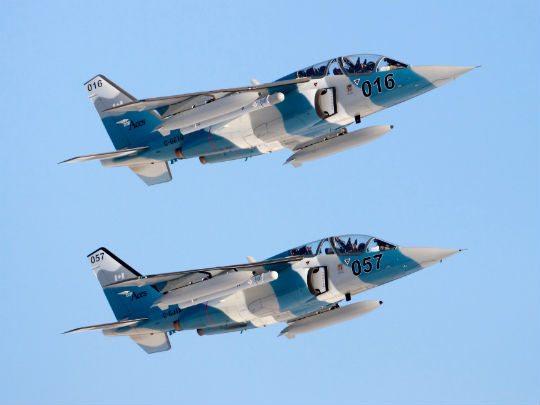Estimated reading time 5 minutes, 53 seconds.
The Canadian Armed Forces opted in 2005 to rely on three standing offers, valued at $94 million, which were awarded to Top Aces, now known as Discovery Air Defence. Discovery Air Defence has been utilizing its fleet of Dornier Alpha jets and IAI Westwind 1124 to fulfill its current contract with the Canadian Armed Forces. Michael Durning Photo
The deadline for proposals to deliver the Canadian Armed Forces Contracted Airborne Training Services (CATS) project has been extended until Feb. 16.
Companies had been asked to respond to a request for proposals (RFP) by Jan. 15, but the closing date was pushed back one month to accommodate questions from interested bidders.
The RFP was one of several projects released in early August just before the federal election was called. Between the 78-day campaign and the holiday season, access to defence procurement officials was limited, an official from one vendor explained.
CATS, a contract estimated at between $500 million to $1.5 billion in the Defence Acquisition Guide, has been operating under interim status for the past 10 years. The program provides the Forces with a range of realistic combat training services in a controlled environment, including airborne simulation of hostile threats for fighter pilots, naval crews and land forces; airborne support to Forward Air Controller training; towed targets to train radar, electro-optical, and infrared-guided weapons system operators; and electronic warfare training for aircrews, land forces, aerospace weapons controllers, and the navy’s frigates.
The services have been provided by a combination of fast fighter jets and slower business jets at bases in Esquimalt, Cold Lake, Bagotville, Halifax and, on occasion, during training exercises in the United States and Mexico.
Originally delivered by the Forces itself through the Air Force Combat Support Squadrons, airborne training services were contracted out on an interim basis in the early 2000s when the two fleets of Bombardier CC-144 Challengers and Lockheed CT-133 Silver Star aircraft were retired.
The Forces would now like to make it a permanent program and will be awarding a 10-year contract, with options for additional two-year and three-year renewals, in 2016. The deal would include airworthy platforms, qualified crews, material, facilities, associated maintenance and engineering support and project management.
Though there have been previous attempts to remove the “interim” label from the program, a competition in 2004 resulted in no compliant bids. Consequently, the Forces opted in 2005 to rely on three standing offers, valued at $94 million, which were awarded to Top Aces, now known as Discovery Air Defence.
Founded by three former CF-18 pilots in 2001, Montreal-based Discovery Air Defence has made the CATS program a core part of its business. Though it has expanded its airborne training services to other countries, including Germany and the United States, CATS remains “our bread and butter,” said Garrick Ngai, the company’s director of marketing.
The program is considered a strong demonstration of the level of training contractors can provide the Forces to sustain high readiness. “Considering we have 10 years of proven performance experience, we want to continue,” Ngai said.
While the core requirements remain largely the same, providing realistic and challenging peer-to-peer training scenarios was a key addition to the new project, he added.
What has also changed is the application of the government’s defence procurement strategy, which includes a robust value proposition that requires industrial technological benefits and a major emphasis on exporting the training service. After signing a deal with the German Armed Forces in 2014 to provide airborne training services, Discovery Air believes it is well positioned to meet that requirement.
Though the company operates modified fleets of Dornier Alpha jets, McDonnell Douglas A-4N and TA-4J jets, and IAI Westwind 1124 aircraft to deliver its various services, it is eying the acquisition of a fourth generation fighter fleet, such as an F-16, to meet a growing worldwide demand for contracted airborne training that it estimates could exceed $1 billion as Western militaries introduce so-called fifth generation fighters.
As with the modifications to Discovery Air Defence’s current fleets, which have now delivered over 55,000 hours of training support, a new supersonic jet would require radar, avionics, navigation, communications and other systems upgrades, all of which would provide high technology opportunities for Canadian small and medium sized business.
Top Aces was selected over Bombardier for the Interim CATS program in 2005. In 2015, CAE acquired Bombardier’s Military Aviation Training business, which includes the NATO Flying Training in Canada program. As the prime contractor for the RCAF’s Operational Training Service Provider program, the Montreal-based company is also a possible bidder on the CATS program.
An official with CAE said the company has a policy of not commenting “on competitive programs we may or may not bid on.”

